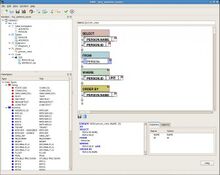Software:Database Deployment Manager
 Database Deployment Manager 0.1f | |
| Developer(s) | The Unauthorized Frog project |
|---|---|
| Stable release | 0.1k
/ 2013-09-26 |
| Operating system | Windows 2000, XP, Windows 7 and Vista, Linux |
| Type | Database Design, Data Modeling |
| License | LGPL |
| Website | sourceforge |
Database Deployment Manager (DDM) is an open-source desktop oriented multi-platform database design tool that allows database administrators and/or programmers to create database structures (using an object oriented methodology) and deploy them into an existing database. The tool allows creation of diagrams to identify basic relations between the defined structures. It is written in C++\Qt[1] and distributed as free software under the LGPL License.[2]
Database support
DDM right now works with[3]
Plans are to extend it to be able to use more databases.
Features
- Create data-types that can be used to create columns in a table
- Management of database tables and views
- Using Object Oriented modeling create table templates which define the structures of a table and then create instances of the table template which is used to physically create the tables in the database
- Create E-R diagrams between chosen tables, export these as graphics or SVG
- Object oriented / flat modeling of table structures
- Load/Save startup data for tables from CSV files
- Database design validation
- Sql script generation for a target database engine and parallel deployment into chosen databases
- Unique visual query builder
- Browsing an existing database and importing tables into the solution
- Version management and track changes of database tables
- Documentation generator
- Reverse engineer a database
Object Oriented Modeling
This feature allows the creation of database tables following the paradigms of object oriented programming. You can have a base table (called a table template), and you can derive (specialize) tables from it. The specialized table will have the columns inherited from the base table, and also you can add new columns to it. The table instances can be populated with default values, and after population they are deployed in the selected database(s). There can be more instance of a table template, each of them can have its own set of default values.
DDM uses a building block approach, all the columns of a table are based on generic data types which are mapped to SQL types of the underlying database, this offers a high grade of re-usability and flexibility when designing a database, and also will make easier the future mapping of Data types to more common programming language types.
License
DDM 0.1j is released under LGPL
See also
References
External links
